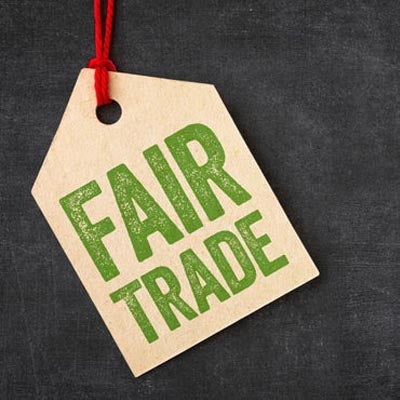A Beginner's Guide to Understanding Sustainable and Ethical Certifications
How to decode eco-labels to make informed shopping choices...
As more consumers are prioritising sustainability and ethics in their purchasing decisions, understanding the various certifications that indicate a product's environmental and social impact becomes increasingly important. This beginner's guide will introduce you to some of the most common sustainable and ethical certifications, helping you make informed choices when shopping for eco-friendly and ethically-made products.
1. Fair Trade Certification
Fair Trade Certification ensures that products are produced according to specific social, economic, and environmental standards:
a. Fair labour conditions
b. Environmental sustainability
c. Community development
The World Fair Trade Organization (WFTO) and the British Association for Fair Trade Shops (BAFTS) are influential organisations committed to advancing fair trade practices worldwide. The WFTO serves as a global network of fair trade organizations, ensuring the adherence to ethical standards throughout the supply chain. Their mission encompasses the creation of sustainable livelihoods, empowerment of disadvantaged communities, and advocacy for social and environmental justice. BAFTS focuses specifically on fair trade shops in the UK, offering support and promotion to businesses that prioritise fair trade principles. These organizations play a vital role in raising awareness, educating consumers, and fostering a more equitable and sustainable global trade system. Discover the impactful work of WFTO and BAFTS in promoting fair trade practices.
2. The Global Organic Textile Standard
GOTS is a renowned certification that holds a leading position in the realm of organic textiles. It sets comprehensive criteria encompassing the use of organic fibres, as well as stringent environmental and social considerations, ensuring a holistic approach to sustainable textile production.
a. Organic Fibres: GOTS places significant emphasis on the utilization of organic fibres in textile manufacturing. These fibres are sourced from plants grown without the use of synthetic fertilizers, pesticides, or genetically modified organisms (GMOs). This promotes soil health, biodiversity, and reduces the potential presence of harmful chemical residues in the final textile products.
b. Environmental and Social Criteria: GOTS certification goes beyond organic fibres and incorporates rigorous environmental and social criteria throughout the entire textile supply chain. It encompasses responsible water and energy usage, proper waste management, and the prohibition of hazardous substances. Additionally, GOTS ensures fair labour practices, including the elimination of forced labour, child labour, and discrimination. It further promotes safe working conditions and equitable wages for workers.
c. Traceability: GOTS places paramount importance on traceability, necessitating the documentation and verification of all stages of textile production, processing, and manufacturing. This facilitates transparency and provides reliable information about the origin and composition of GOTS-certified products. Through traceability, consumers can confidently make informed choices, trusting in the authenticity and integrity of the textiles they purchase.
The GOTS certification offers assurance to consumers that the textile products they select meet stringent organic and sustainability standards. By opting for GOTS-certified textiles, individuals actively support environmentally responsible practices, fair labour conditions, and the overall well-being of both people and the planet. Choose GOTS to embrace a sustainable and ethical approach to textiles.
3. The Forest Stewardship Council
FSC plays a crucial role in ensuring responsible forest management through its globally recognized certification system. With a focus on sustainability, the FSC certification provides assurance that forests are managed in an environmentally and socially responsible manner.
a. Sustainable Forestry: FSC certification sets rigorous standards for sustainable forestry practices. This includes promoting biodiversity conservation, protecting wildlife habitats, and preventing deforestation. It also requires adherence to responsible harvesting methods, ensuring that forests are managed to maintain their long-term health and productivity.
b. Chain of Custody: The FSC certification encompasses a comprehensive chain of custody process, which tracks the flow of certified materials throughout the supply chain. This traceability system ensures that products bearing the FSC label can be traced back to responsibly managed forests. It provides transparency and allows consumers to make informed choices, supporting sustainable sourcing and production.
c. Label Types: The FSC offers different label types to signify varying levels of FSC-certified content. The FSC 100% label indicates that the product is made entirely from FSC-certified materials. The FSC Mix label denotes that the product contains a combination of FSC-certified and controlled sources. Additionally, the FSC Recycled label signifies that the product is made from recycled materials. These labels provide clarity and enable consumers to identify and support products that align with their sustainability values.
By seeking out products with the FSC certification and supporting responsible forest management, individuals contribute to the preservation of forests, protection of biodiversity, and promotion of sustainable livelihoods for local communities. The FSC certification empowers consumers to make environmentally conscious choices and promotes a sustainable future for our planet.
4. B Corporation Certification
B Corp is a prestigious designation awarded to businesses that demonstrate exceptional standards of social and environmental performance. This certification signifies a commitment to making a positive impact beyond just profit, prioritising sustainability and responsible business practices.
a. Holistic Assessment: B Corporation Certification entails a rigorous and holistic assessment of a company's overall impact. It evaluates various aspects, including governance, workers' welfare, community engagement, environmental sustainability, and business transparency. This comprehensive evaluation ensures that certified businesses meet stringent criteria across multiple dimensions of social and environmental performance.
b. Continuous Improvement: B Corporations are committed to continuous improvement, striving to set higher standards and drive positive change within their industries. They actively seek ways to enhance their social and environmental practices, utilising the certification framework as a roadmap for progress. By regularly measuring their impact and implementing improvements, B Corporations contribute to a more sustainable and equitable business landscape.
c. Trustworthy Businesses: B Corporation Certification instills trust and credibility in certified businesses. It assures consumers, investors, and other stakeholders that these organizations operate with integrity, transparency, and a genuine commitment to social and environmental responsibility. Choosing to support B Corporations means supporting businesses that are accountable and trustworthy, aligning values with actions.
By seeking out products and services from B Corporations, individuals can make a positive impact with their purchasing choices. These certified businesses prioritise sustainability, social justice, and environmental stewardship. Through their commitment to holistic assessment, continuous improvement, and being trustworthy, B Corporations lead the way towards a more sustainable and responsible business landscape.
By familiarising yourself with these certifications and supporting certified products, you can contribute to a more sustainable and socially responsible economy. Start or continue your journey toward conscious consumerism with the knowledge and confidence to navigate the world of eco-labels and certifications.












Leave a comment
All blog comments are checked prior to publishing